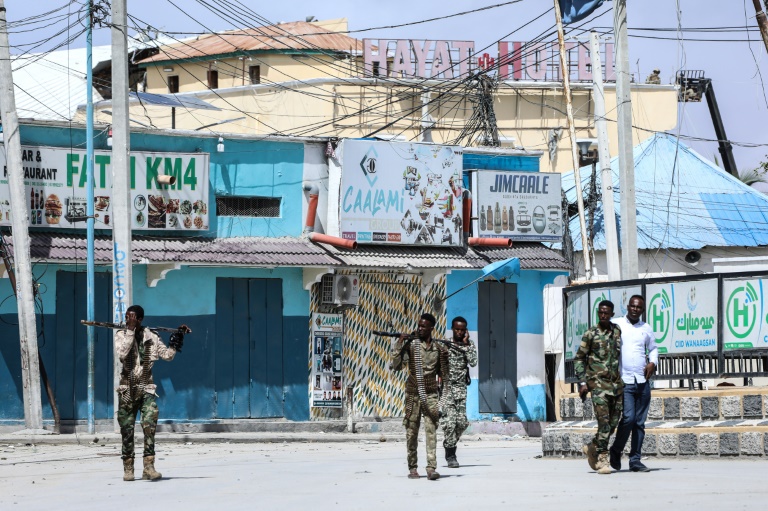
Mogadishu (AFP) - Somali security forces bombarded a Mogadishu hotel on Saturday as they battled to end a deadly siege by Al-Shabaab fighters that is now in its second straight night, witnesses said.
At least 13 civilians have been killed since miiltants from the Al-Qaeda affiliate unleashed a gun and bomb attack on the popular Hayat Hotel on Friday evening, according to Somali officials.
Security forces are now striking the building with heavy weapons, witness Salaad Ali said.
"Part of the hotel is on fire, there were at least two heavy explosions and several other smaller scale ones,” said Ali, who told AFP he was watching the drama unfold from the rooftop of another building.
"We can see the flames of the weapons used, the fire is raging and we can still hear sporadic gunfire."
Scores of people were trapped when the assault began and although officials said dozens had been rescued, including children, it is not known how many remain inside.
Unverified pictures posted online showed security officials walking through piles of rubble, with reports of widespread damage to the hotel.
The government has yet to make any public comment on the attack, the biggest in Mogadishu since Somalia's new President Hassan Sheikh Mohamud took office in June after months of political instability.
Al-Shabaab, which has been waging a deadly insurgency for 15 years against the fragile government in the Horn of Africa nation, has claimed responsibility.
Security commander Mohamed Abdikadir told AFP that the number of civilians confirmed to have died was 13, while police officer Ibrahim Duale put the toll at more than 10.
The director of Mogadishu's main trauma hospital, Mohamed Abdirahman Jama, said it was treating at least 40 people wounded in the hotel attack and a separate mortar strike on a seaside area, Hamar Jajab.
"Among those critically wounded are a newlywed bride and her groom and a family of three children, a mother and their father," Hamar Jajab district commissioner Mucawiye Muddey told AFP.
- Children found hiding in toilet -
One woman, Hayat Ali, said three young relatives aged between four and seven were found by security forces hiding in a hotel toilet in a state of shock but were later reunited with their family.
Another survivor told AFP he and some colleagues had performed evening prayers before taking tea in one of the hotel's open spaces when they heard the first explosions Friday, the start of the weekend in the mainly Muslim country.
"I managed to run to a nearby exit gate away from the gunmen," Hussein Ali said.“The gunmen started firing and I could hear the shots behind me, but thanks to God...we managed to escape."
Somalia's allies including the United States, Britain and Turkey as well as the UN have strongly condemned the attack.
ATMIS, the African Union force tasked with helping Somali forces take over primary responsibility for security by the end of 2024, voiced "solidarity with the Federal Government of Somalia to continue with the joint fight against the terrorists".
Witnesses had reported at least two powerful explosions on Friday as gunmen burst into the hotel, a popular spot for local officials and lawmakers.
Police said the initial blast was caused by a suicide bomber who forced his way into the hotel with other gunmen.
Witnesses said a second explosion occurred just minutes later, inflicting more casualties as rescuers, security forces and civilians rushed to the scene.
Al-Shabaab spokesman Abdiaziz Abu-Musab told the group's Andalus radio earlier Saturday that its forces were still in control of the building and that they had "inflicted heavy casualties".
The jihadists have carried out several attacks in Somalia since Mohamud took office and last month launched strikes on the Ethiopia border.
Earlier this week, the United States announced its forces had killed 13 Al-Shabaab operatives in an air strike, the latest since President Joe Biden ordered the re-establishment of a US troop presence in Somalia, reversing a decision by his predecessor Donald Trump.
Decades of chaos
Mohamud said last month that ending the jihadist insurrection required more than a military approach, but that his government would negotiate with the group only when the time was right.
Al-Shabaab was driven out of Mogadishu in 2011 by AU forces, but still controls swathes of countryside and is able to launch deadly strikes on political, civilian and military targets, with hotels and restaurants often hit.
Earlier this month, Prime Minister Hamza Abdi Barre appointed the group's former deputy leader and spokesman, Muktar Robow, as religion minister.
Robow defected from Al-Shabaab in 2017, with the US government at one point offering a $5 million bounty for his capture.
Somalia has been mired in chaos since the fall of president Siad Barre's military regime in 1991, with civil war and the ascendancy of Al-Shabaab.
The deadliest attack occurred in October 2017 when a truck packed with explosives blew up in Mogadishu, killing 512 people.






